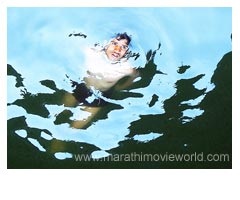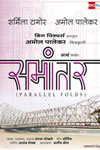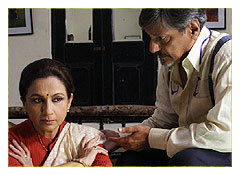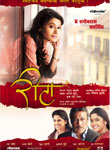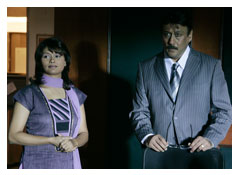‘Gaiir’ is a well presented movie
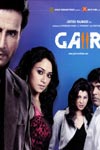 |
Rating: 3/5
Presenter: Sanjay Ghodawat Groups Production: Kruti Films Director: Satish Rajwade Story- Screenplay: Parag Kulkarni, Shirish Rajwade Cast: Sandeep Kulkarni, Ankush Chaudhary, Amruta Khanvilkar, Tejaswini Pandit, Uday Tikekar, Vidyadhar Joshi, Ila Bhate, Amita Khopkar, Sandeep Pathak, Mahesh Joshi Movie Review by: Saurabh Karnik |
Ferrari, Lexis, Chopper, lavish sets, and stunning outdoor locations… hey, I am not talking about any big budget Hindi film. These are some of the specific characteristics of latest Marathi movie – ‘Gaiir’. But still these are not the most attractive features, which would make the audiences appreciate this movie. There is a tight script, mind-boggling dialog, dazzling acting, excellent camera and technical work that makes the movie presentable . In short, it’s a perfect movie not just because of its big budget but also because of dedication and efforts put in by cast and crew of the movie.
As indicated in the promos it is a suspense thriller movie. Sameer Shroff (Sandeep Kulkarni) is a corporate giant. Smart, young, good looking and dashing personality. He marries an NRI’s daughter – Neha (Amrtuta Khanwilkar). Just like other newly married couples, they have a dream of pleasant future ahead. Suddenly, Neha and some other friends and colleagues of Samir realise that Samir’s duplicate exists in the same city. Samir’s duplicate targets Neha and tries to disturb his personal as well as professional life. Inspector Avinash Sardesai (Ankush Chaudhari) helps Sameer to solve the issue. Finally, movie ends with shocking end, certainly worth watching on the big screen.
The movie has good star cast including Sandeep Kulkarni, Amruta Khanwilkar, Ankush Chaudhari, Ila Bhate, Uday Tikekar and everybody has given superb performance. But still there is only one award for man of the match and it is none other than Sandeep Kulkarni. We had seen him in Shwaas, Dombiwli Fast, Made in China – all movies were based upon some social issues. But the way he has changed his body language, facial expressions, looks to present a legendary businessman, is simply amazing. Ankush’s performance was great as usual but Marathi film industry has got another talented actress in the form of Amruta and she is proving it with her every film. Uday Tikekar, Ila Bhate and Tejaswini Pandit’s performances were pleasant and increased the flavor of the movie. Vandana Gupte and Chinmay Mandlekar’s short but sweet appearances were also pleasing.

What makes a movie great from good is perfect combination of on screen and off screen (technical) performance and Gair is an ideal example of it. Parag Kulkarni has written a fantastic story, Satish Rajvade has given golden touch with good screenplay and Satish and Parag have made it even better with hard hitting dialogs. We have seen Satish’s talent in his previous movie – Ek daav Dhobipachad.. Background music has played major role in enrichment of the movie and due credit has to be given. The movie catches the attraction even with the effective use of background score. Even post production method is beautifully handled. Extra cuts, misbalancing effects are used beautifully. Atul Shidhaye has given useful contribution in styling of the movie. But movie loses it’s hold over audiences for last 5-7 minutes, also the idea of using romantic ‘Hindi’ song in Marathi movie is not acceptable.
‘VIHIR’ REVIEW
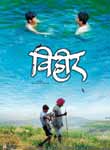 |
Rating: na
Presenter: Saraswati Creations, AB Corp Limited Producers: Ramesh Pulapka, AB Corp Limited Director: Umesh Kulkarni Camera: Sudheer Palsane Story & Screenplay: Girish Kulkarni, Sati Bhave Music: Mangesh Dhakade Cast: Girish Kulkarni, Amruta Subhash, Mandar Deodhar, Renuka Daftardar, Dr. Mohan Agashe, Ashwini Giri, Jyoti Subhash, Sulbha Deshpande Movie Review by: Sandeep Hattangadi |
The much appreciated film which won laurels at many international film festivals like Berlin, Pusan, and MAMI, ‘Vihir’ is indeed a good film to watch for discerning audience.
Sameer (Mandar Deodhar) a city boy comes to meet his country folks and is delighted to meet his cousin Nachiket (Alok Rajwade) who is elder to him and they share a unique bond between them. They share their happiness and sorrows besides dreams , ambitions and family problems like their elder’s behavior, while swimming at a nearby well.
This well (Vihir), is a silent spectator to this unique growing up angst and takes an ugly turn when Nachiket drowns in it. This loss of his cousin and an early experience with death makes Sameer distraught and confused about life in general.
He can’t adjust to his new city life without his much loved brother and turns a wanderer, who goes from place to place without any real reason. Ultimately, he comes to terms with his personal tragedy.
This bitter-sweet tale is something very different from the regular fare dished out. The direction by ‘Valu’ fame Umesh Kulkarni is very sensitive and gives an autobiographical touch. His symbolic representation of the ‘well’ is very impressive. The performances by the two boys(Mandar and Alok) especially Mandar, is exemplary. His adolescent search for meaning of ‘life portrayal’ is superb.
Girish Kulkarni (who has written the story of this film) is impressive as their jolly uncle. Veteran artistes like Dr.Mohan Agashe, Jyoti Subhash, Sulbha Deshpande, lend good support. Amruta Subhash, Veena Jamkar and Renuka Daptardar are effective.
Music by Mangesh Dhakade is tuneful. The cinematography by Sudhir Palsane has already won awards for his excellent visuals of the countryside and the illuminated city.
The editor Niraj Voralia could have cut particular sequences like the boy traveling in the train and few other which are time consuming. This AB Corporation venture, certainly succeeds in keeping their banner’s reputation intact. Let’s hope they continue to support Marathi films in the future too.
Go watch it and enjoy a ‘different’ film!
‘Jogwa’ comes out strong against superstition
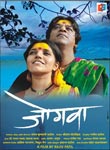 |
Rating: 4/5
Presenter: IDream Productions Pvt. Ltd Producer: Shripal Morakhia Director: Rajiv Patil Screen Play: Sanjay Patil Music: Ajay Atul Cast: Upendra Limaye, Mukta Barve, Vinay Apte, Amita Khpkar, Kishor Kadam, Sharvari Movie Review by: Ulhas Shirke |
Television and Cell phones have reached most of the villages in India. We talk about reforms but superstition still exits in many villages. The so called society, which treats the Jogtas and Jogtins as children of Goddess, go to the extent of exploiting them with inhuman treatment by branding them as Eunuchs and prostitutes. The latest marathi film ‘Jogwa’ goes on to show the naked truth in such a society in an effective manner. Director Rajiv Patil ( ‘Savarkhed Ek Gaon’ & ‘Sanai Choughade’fame ) takes up this burning issue, which still persists in few villages in India.
Set on the backdrop of a village in Karnataka, where Goddess Yelamma’s strong influence leads to interpretation by some money minded people to exploit the villagers in the name of superstition. In fact, the influence of the Goddess is just a metaphor, to show how the villagers are made to believe in old rituals to cure from an ailment or minor disorder. In the case of young girl Suli( Mukta Barve) , her mother faces a knot while combing her daughter’s hair and considering it as a serious issue, Suli is taken to Akkubai( Amita Khopkar) who is an interpreter. With her team of Jogtins and Jogtas she forces the family to offer their daughter to serve the Goddess. At the same time a youngster– Tayappa( Upendra Limaye) is brought by his father( Vinay Apte) to the same place, as he has been passing blood through urine. Tayappa is forced to become a Jogta, much against his wish.
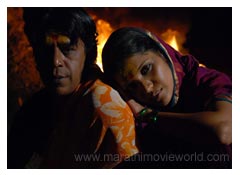
Soon Tayappa gets adapted to the lifestyle of Jogta and he sings in the name of the Goddess and earns for his living. Suli learns to dance to please the Goddess. She falls in love with a stranger, who comes to village for his earnings. She flirts with him; but when it comes to contract marriage to support her; he runs away. Tayappa loves Suli from his heart, but he cannot express his love. Finally, both the victims come together for common cause. They revolt against their society and the film conveys a clear message of fight against superstition.
‘Jogwa’ is well presented with superb photography, perfect locations, good editing work and well suited music score. The film has appropriate artistes placed at the right spot. There is also a teacher who is educating the villagers to stay away from wrong practices. “ I am not against worshipping the Goddess, but the interpretation of offerings to Goddess is wrong. The Government wants to rehabilitate all Jogtas and Jogtins, through reforms,” he pleads. His repeated appeal only helps two sensible youngsters to revolt against the existing practice. But, one fails to understand as to why the two lovers, don’t approach the teacher-cum-social worker to come out of the trap. Why they had to go and challenge their own people in the open? But, then, without melodrama, there cannot be a cinema.
In all, ‘Jogwa’ is a very sensible film and a worth watch for all those freedom loving youngsters living in city; so that they understand the plight of their counterparts living in villages , who are subjected to atrocities by their own people in the name of superstition. Both Upendra and Mukta have come out with wonderful performances. Their hot love scenes have been captured well. Among the other performers, Kishore Kadam, Vinay Apte and Shravani Pillay are impressive. Music by Ajay-Atul is good.
‘SAMAANTAR’ REVIEW
|
Rating: na
Presenter: Big Cinemas Production: Sarth Director: Amol Palekar Story- Screenplay: Sandhya Gokhale Cast: Amol Palekar, Sharmila Tagore, Samir Dharmadhikari, Radhika Apate, Ashwarya Narkar, Vandana Gupte, Makarand Deshpade, Movie Review by: Ulhas Shirke |
Both Amol Palekar and Sharmila Tagore are intense performers, when it comes to playing multi layered characters filled with varied range of emotions. Over the years they have proved their class through their respective performances in different films. And, when you would like to see them working together almost after thirty years, the script has to be equally strong like two parallel lines to equate their characters. Story- screenplay and dialogue writer Sandhya Gokhale has done exactly that when she wrote the script of new Marathi film ‘samaantar’, where you will find the duo together playing opposite each other. Amol Palekar , who has himself directed this film, has been honest enough to offer Sharmila Tagore enough of scope to do justice to her character of Kshama in the film.
‘samaantar’ talks about a simple lost and found tale of a man and a woman, but in an artistic manner. Keshav Vaze( Amol Palekar) a sixty year old successful industrialist expresses his desire to retire from business, when he feels that as a guardian of his brother’s children, he has done his duty and has now reached a stage to retire from his life too. Keshav, who as a youngster is a mute witness to a major tragedy at his village with the death of his near and dear ones, takes up the responsibility to support his brother’s children, sacrificing his own life.
‘samaantar’ unfolds the mystery behind his decision of calling for early declaration from life, when he visits Kolkutta on an invitation from a medical foundation, where he has donated a huge sum for construction of a Hospital. He meets Kshama,( Sharmila Tagore) his long lost beloved, who has been living a silent life along with her son, who is a Psychiatrist. Kshama is living like a patient still under trauma, who does not talk to anyone but does her job as a sculptor. Even her son, with whom she converses very little, is not able to understand the reason behind such a behaviour.
‘samaantar’ does not bring out the past relationship between the two in their first meeting after years, but unfolds the same in the very next meeting, when Vaze’s adopted daughter Rewa brings him to Kolkatta , for a change, after noticing his withdrawal symptoms from the family members. It is at this stage, the script reveals the background of the relationship between the two. Amol Palekar as a director has very cleverly shot the flashback scenes with images and dialogues. His intelligence in shifting the scenes is remarkable. Any other director would have opted for airport scenes or the flight taking off or landing to show the journey between Mumbai and Kolkatta. But, Amol has just been indicative through dialogues. He has focused more on the individuality of every character. All the sequences have been shot with a lot of study paying more attention on ambience and art, whether it was an indoor scene or an outdoor location with the backdrop of River Ganges.
The film also has supporting performers like Samir Dharmadhikari, Aishwarya Narkar, Radhika Apte, Sandip Mehta, Rishi Deshpane, Makarand Deshpande and Vandana Gupte doing justice to their respective roles. Music by Anand Modak is appealing with singers like Shankar Mahadevan, Shreya Ghoshal adding elegance into it. The background ‘Majhi’ style song ‘Navika Re Haati Tujhya’ rendered by Sudesh Bhosale reminds you of legendary S.D. Burman. In all, Amol Palekar as a film maker has very effectively mixed the Bengali culture into this neatly made Marathi film. Both Amol Palekar and Sharmila Tagore have given splendid performances. The film is a worth watch
‘RITA’ REVIEW
|
Rating: 2.5/5
Presenter: Walkwater Producers: Aarti Shetty, Pooja Shetty Devara Director: Renuka Sahane Story: Based on Marathi Novel ‘Rita Velvinkar’ by Shanta Gokhale Cast: Pallavi Joshi, Renuka Shahane, Jacky Shorff, Sai Tamhankar, Dr. Mohan Agashe, Tushar Dalvi… Movie Review by: Priyanka Dahale |
We always quivers from our past, present if it is painful. Even we never think about any relation, which is, cannot be accepted by society. Very few dare to face their past, their painful present and also dare to live unacceptable relation openly. Rita is the movie, which is based on the above lines concluded from Shanta Gokhle’s book. In the Marathi film industry, this movie gets special significance due to a sensible direction of Renuka Shahane, and also due to different presentation of different story.
Rita Welinkar is the main character in this film. Rita is the girl who got an English environment in her family by her father and mother. The image of her mother in her eyes is ‘a perfumed women’ just due to her high cultured, high fashioned lifestyle. She never saw original shade of mother’s love in her mother’s eyes. While growing in ‘conventry’ environment, suddenly a problem occurs in her family and she had to take all the responsibility of the family on her delicate shoulders. During this journey of a common struggle she met Viththal Salvi who is 15 years elder than her. As the time passes she realized that she is in love with Salvi. Same case about Salvi. And Rita starts a new life to understand herself and also to live for herself. She built up her own world with Salvi.
But lots of social, mental problems arise in their life due to their unacceptable relation. Rita always prefers to live openly, to make relations openly with divine and clear mind. But the situation does not allow her to live in her own way. In this travel one of her friend Saraswati helps her to stand strongly after facing storms.
The story puts lots of questions before the viewers patiently and in a decent way. Pallavi Joshi and Jackey Shroff had played roles of Rita and Salvi excellently. Mohen Aagashe, Makarand Deshpande, Renuka Shahane are the remarkable actors in this film who played their characters artistically.
The whole film have southern touch in its scenes, dialogues that give a beautiful feel of wonderful nature to viewers. Taufic Quereshi’s background music suits this feel very beautifully. This movie is the example of a ideal and sensible Marathi movie.
Review of Marathi Film Anolkhi He Ghar Majhe
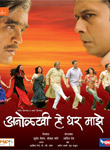 |
Rating: 3/5
Presenter: Nomad Films, Akshar Films Producer: Juned Menon, Shekhar More Director: Sachin Deo Story: Mahesh Manjrekar Music: Ashish Rego, K.C. Loy Cast: Ashok Saraf, Tushar Dalvi, Kavita Laad-Medhekar, Sushant Shelar, Pushkar Shrotri Movie Review by: Ulhas Shirke |
In the year 1987, T. Rama Rao made a family social with the name of ‘Sansaar’ in Hindi, starring Anupam Kher, Seema Deo, Raj Babbar, Rekha, Archana Joglekar, Shekhar Suman and Ajinkya Deo in important roles. Now, exactly 22 years later Director Sachin Deo comes up with its Marathi version in the name of ‘Anolkhi He Ghar Majhe’. So, how do you call this Ghar Anolkhe, when it is just a new ‘Sansaar’? One can understand about the situation then and now, but the human tendency hasn’t changed. Whether it is father’s ego with the progression of age or son’s selfishness, when it comes to living in a joint family system. Nothing seems to have changed. In fact, with the prevailing nuclear family system, we hardly find joint family system existing now. But, film makers Junaid Memon and Shekhar More thought that this was the right time to strike with the old formula to spread awareness among the new generation. .
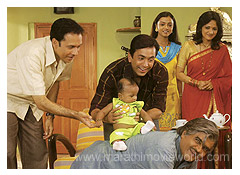
So, Din Dayal Sharma is replaced by Jagannath Deshmukh( Ashok Saraf) who takes retirement from his job and pays off the debt that has multiplied over the years for bringing up his three sons and making two of them capable of shouldering their responsibilities. He thinks that his elder son (Tushar Dalvi) who is having a good job and his second son ( Pushkar Shroti) who is a motor mechanic; would be able to support the family. The youngest son ( Sushant Shelar) is in the final year of Engineering. With the eldest son already married to Shubhada( Kavita Laad Medhekar), the senior Deshmukh looks a happy man wanting to relax rest of his life. Kavita Laad in Anolkhi he ghar majhe
But, sensing the burden of expenditure falling upon him after his father’s retirement and with the marriage of his brother followed by the return of his married sister back home after dispute with her husband ; Shekhar opens up a fight with his parents, over expenditure sharing at home. This happens when his wife goes for delivery to her parent’s place. This sudden outburst by the eldest son also hurts old man’s ego and he draws a line in their big house earmarking two parts. He swears to teach his elder son a lesson. With the moral support of his second son who earns extra doing night shifts, he himself takes up a job in a library.
So, you find two families living in the same house, when Shubhda returns with her baby. She is shocked to find this division, being the most sensible person in the family. At this stage, Shubhada takes the lead to reunite the family, taking steps one by one. And then, this family drama of almost two and half hours, concludes with happy ending. Ashok Saraf , plays the family head in his own style, but his wig does not look natural. Meghna Vaidya plays his wife- Malati with ease. Both Tushar and Kavita as husband and wife look very natural in their behaviour, especially while supporting each other very well in all the scenes they have done together. Pushkar Shroti is good as the most obedient son, while Sushant Shelar looks a perfect student, who gets one good scene to express his emotions. The other supporting artistes have done well, with very small role for Arun Tikekar.
‘Anolkhi He Ghar Majhe’ is otherwise a well presented film, but has dragged too long with almost 5 -6 songs picturised in outdated format. Those who have missed Hindi film ‘Sansaar’, shouldn’t miss this film, which a film for entire family.
GANDHA REVIEW
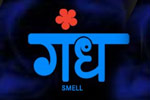 |
Rating: na
Presenter: Flashbulb Ventures Producers: Pritam Bhandari, Rajesh Goyal, Sandeep Kankariya Director: Sachin Kundalkar Camera: Amalendu Chowdhari Music: Shailendra Barve Cast: Milind Soman, Sonali Kulkarni, Neena Kulkarni, Amruta Subhash.. Movie Review by: Saurabh Karni |
Marathi Theater is known for new experiments and the new generation entering in the Marathi film industry is closely associated with Theater. Films and Theater has its own advantages and disadvantages. Yes, combination of both would definitely enrich the feel of the movies only if the combination of both mediums is perfect. And that’s what Sachin Kundalkar made with ‘Gandha’ and took the movie at different level and makes it ‘great’ rather than a ‘good’ movie.
The movie has combination of three stories. There is no interconnection as such in the stories but at the end even a common viewer can connect the stories. Prospective toward movie can differ from person to person but each and everyone can definitely connect himself with the film.
First story – ‘Lagnachya vayachi mulgi’ starts with a light comedy mood. Veena (Amruta Subhash) waiting to be a bride (infact her parents in hurry to see her in bridal get up), her dreams (sometimes sound ‘typical’), little expectations from her life partner, her ‘Puneri’ parents, traditional ‘Dakhavne’ or ‘Kande-Pohe’ program and so on is presented. She finds her dream partner in a student of art school – Girish Kulkarni where she works as a clerk. Then her feelings, attraction, realization between dream and reality are put across amazingly.
Second story – ‘Aushadhe ghenaaraa maanus’ is based upon a modern relationship. Sarang (Milind Soman) is a HIV positive person.
Her wife Raavee (Sonali Kulkarni) who had left him long time ago visits Sarang’s place and the story moves forward through their conversation. Various incidences of their past life, relationship comes as references.
Third story – ‘Bajula Basleli Bai’ is presented with background of Kokan with a bit feministic approach. Jaanaki (Nina Kulkarni)- a typical wife and daughter in law of middle class Marathi family doesn’t have any child even after many years of marriage. Her husband’s sister is pregnant and came for the delivery. Unfortunately Jaanaki couldn’t help at all as it is not allowed to her during ‘those days.’ Though the story has lots of feministic approaches, it has presented in entirely different manner. It not only shows her sorrows but also explains her importance at her home, what so ever.
The movie has huge starcast including Sonali Kulkarni, Amruta Subhash, Nina Kulkarni, Milind Soman, Jyoti Subhash and many others. Each and everybody have played character beautifully. Every character of the story has it’s own features, nature, emotions and that sounds perfectly natural. We could feel that every character can be find around us in real world.
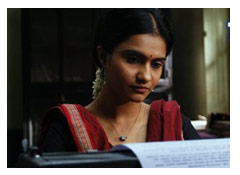
Director has skillfully used more facial expressions than words and every expression takes the story forward. Sonali is great as usual. Nina Kulkarni’s acting is haunting, as usual. Jyoti Subhash, Girish Kulkarni have supported the movie perfectly. Milind Soman’s first
ever experience in Marathi film is pleasant. Amruta Subahs’s acting sound effective but a bit monotonous. Audiences are so used to her ‘typical’ expressions (especially smile) that most of the times they could easily predict her expressions.
I would give 110 out of 100 to Sachin Kundalkar as a director. I have no words to admire him. As the name ‘Gandha’ suggests various things like ‘Balantinichi kholi’, flowers (particularly Sonchafa), perfumes, rain, ‘gandha’ of love and anger, ‘gandha’ of body are used skillfully in the movie. Sachin Kundalkar has transformed himself from the theater to film and he has amazingly combined plus points of both mediums. Theatrical language used so marvelously in the movie that we could feel live ness of the film just like theater. Use of space is always a plus point of Sachin’s plays and he has deliberately used extremely efficiently in the movie. conjested place of Puneri Peths, different diemetters of Wada at Kokan, modern home is used remarkably well. The spaces also make comments over the spaces between different relations.
The movie moves forward with expressions, music and different sounds rather than dialogues. Various forms of music have been used quiet effectively and logically. Credit must be given to Shailendra Barve and Anmol Bhave. Shailendra Mehetre has enriched the flavor of the movie with his cinematography. Abhijit deshpande’s performance as an editor is remarkable.
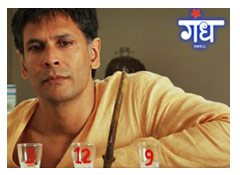
Like love, anger, sorrow, joy, ‘Gandha’ is undetectable part of our life. We feel it in our life while first rain, romance, flower, newly born baby and with many other examples. But do we really notice it? Admire it? Like love, meaning of ‘Gandha’ changes person-to-person, situation-to-situation, age-to-age, and context-to-context and that has been superbly presented through the movie. Someone cannot find any connection in three stories or someone can find several. Everybody would describe the movie as per his/her experiences. But the fact of the matter is the movie relates each and every audience, irrespective of prospective and that is the real success of the movie
GABHRICHA PAUS REVIEW
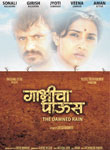 |
Rating: na
Company: Pacific Entertainment Producer: Prashant Madhusudhan Pethe Story, Director: Satish Manwar Lyricst: Dasu Cinematographer: Sudhir Palsane Music: Dattaprasad Ranade Editor: Suchitra Sathe Cast: Girish Kulkarni, Sonali Kulkarni, Jyoti Subash, Amar Attar, Veena Jamkar, Mukund Vasule, Madhukar Dhore, Rajesh More Movie Review by: Kashmira Pawaskar |
It is observed that the Rain brings the sweet smell of soil with its first showers, then it’s time to pour heavily in Ashadh; which is the actual monsoon month and then it sprays gradually during Shravan . These are the different faces of rains, which makes everyone crazy, be it a child, youth or elders. But, Rain adds a special significance to the dreams and happiness in farmer’s life, especially in Maharashtra. But, many farmers sometimes call it a ‘Damned Rain’ (Gabhricha Paus), when it pours more than required.
Incidentally, ‘Gabhricha Paus’ is the name of new marathi film released recently. Every movie has a hero and a villain and we generally witness a conflict between good and bad etc. But, this movie is totally different. It highlights only two things; the farmer and the rains. You may call it a black humour, which can be seen either in the books of late P.L. Deshpande or try to locate the same in a movie like ‘Bicycle Thief’.
Kisna (Girish Kulkarni) is a poor farmer from a village in Maharashtra, who like his counterparts is eagerly waiting for the rains, in his draught hit village which is known for suicides of farmers. The story of the film is very simple. It begins with a scene where Kisna’s farmer friend Bhaskar staying in the neighborhood, commits suicide, as he is unable to repay his loan. Kisna’s family comprising of his wife Alka (Sonali Kulkarni) , his mother(Jyoti Subhash) and son- Dinu( Aman Attar) get worried as they feel that even Kisna would attempt the same. They try there level best to keep him happy and with the screenplay filled with humorous situations the film goes on to show their lifestyle in a realistic manner
The efforts of writer-director Satish Manwar have to be appreciated, for using his skill to film such difficult and serious issues throughout the film, with a difference. The succeeding suicide of another farmer is shown with a different angle, where the surviving members of family struggle hard to claim the compensation, due to their poor condition and lack of awareness about the paper work. The small kid is shown happy collecting rupee coins thrown during the last rites before cremation. The movie doesn’t have any melodrama, as witnessed during suicides. Every frame of the film is a pleasure to watch for the wonderful cinematography by Sudhir Palsane. The background score has been cleverly used with movement of train and bus, showering of rains and with the use of FM Radio and TV etc.
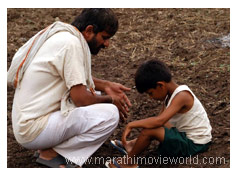
In the film, the performance of the small innocent boy Dinu played by Amaan Attar is more appreciable. Girish Kulkarni and Sonali Kulkarni steal the show with their beautiful chemistry. Sonali has given full justice to her role but her make-up and costume does not go well with the character. Veena Jamkar’s performance is also very nice, as she expresses all emotions through her eyes.
The whole movie talks about ‘living under the fear of death of the near and dear ones’; which makes the audience think seriously about the grave existing situation faced by poor farmers. And, this is where the film maker delivers his message effectively. The climax is very beautifully crafted, which can place the movie at par with world cinema.
‘Hello- Gandhe Sir!’ – A Bharat Jadhav Vehicle
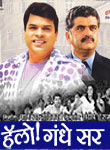 |
Rating: na
Presenter: Prabhakar Films Producer: Dyaneshwar Govekar Director: Sandip-Samip Story: Anil Pawar Music: Pravin Kunwar Camera: Sameer Athale Cast: Bharat Jadhav, Dr. Girish Oak, Suhas Palshikar, Mangala Kenkre, Siya Patil, Nayan Jadhav, Vijay Kenkre, Ravindra Berde, Vinay Yedekar… Movie Review by: Sandeep Hattangadi |
Bharat Jadhav is a very saleable name on the marquee today and some of his films are only written for him. Writer Anil Pawar has written ‘Hello-Gandhe Sir’ keeping only Bharat in mind and he delivers in a style.
Gangya (Bharat Jadhav) is a ‘tapori’ kind of guy who wants to enjoy life on his own terms after being physically and mentally abused by an ambitious hawaldar father (Suhas Palshikar) who wants his son to be a Collector, but he turns out to be an academic failure. Fate leads Gangya to a college where he is appointed as a dance teacher but the principal (Dr.Girish Oak) is a strict disciplinarian who hates art forms like acting, dancing, etc. and believes that bookish learning is the only education for the young.
But, Gangya rebels against him and his ideas and in this fight loses his life. He comes back as a ghost and transforms Gandhe Sir into a caring, compassionate, fun loving person. The film in its first half seems to be inspired by films like ‘Sound Of Music’ and ‘Dead Poets Society’ and the latter half resembles the Salman Khan hit ‘Hello Brother’ and the Ashok Saraf’s hit ‘Ek Daav Bhootacha’.
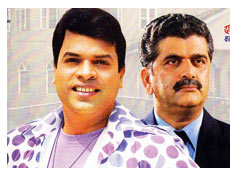
Anyway, the film does entertain and the director duo Sandip Deshpande-Samir Naik make a good debut. The performance by Bharat Jadhav is one of his best in recent times. Dr.Girish Oak is a good choice. Vijay Chavan as ‘mama’ and Ganesh Divekar also produce laughters. Mangala Kenkre, Sia Patil, Nayan Jadhav, Vijay Kenkre, Ravindra Berde and guest actor Vinay Yedekar lend good support.
The cinematography by Sameer Athalye is a bit erratic with brightly lit scenes first and dull scenes later on. But the final product has good technical values. The music score by Pradeep Kunvar is tuneful and the lyrics by Samruddhi Pawar are good. The editing is a bit jerky. The choreography deserves a special mention.
GALLIT GONDHAL DILLIT MUJRA REVIEW
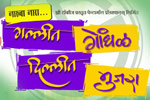 |
Rating: na
Presentor: Zee Talkies Producers: Pentagon Productions, Director: Nagesh Bhonsale Stroy: Arvind Jagtap Cast: Sayaji Shinde, Makarand Anaspure, Nagesh Bhonsale Movie Review by: Rohan Desai |
Marathi Cinema has a great tradition of movie in the areas of politics as well as comedy. When it comes to political movies, the real blockbusters, whose powerful impact still there in the minds of viewers are ‘Sinhasan’, ‘Vajeer’, and ‘Sarkarnama’. These are the milestones when it comes to political movies.
“Gallit Gondhal …..” has almost nothing in common to these movies except that it is also a political movie and like Sarkarnama it is about the political rivalry (to some extent) .What will happen if comedy and politics merge together ; the answer is the movie “Gallit Gondhal ….”, a complete entertainer .
Story of a movie revolves around 3 characters, Aamdar Chandrakant Tope (Sayaji Shinde), Sarpanch Bajirao Dole (Nagesh Bhosle) and Narayan Wagh (Makrand Anaspure). Tope and Dole are the strong enemies to each other and both compete for election tickets from a party. Narayan is a patch up guy between them, who is friendly with both of them and shows both of them that he is with them only. But Narayan is a smart guy who is also competing for the same ticket with these two. So, who finally wins and what funny strategies were made to win over other on every step is a treat to watch in a movie.
Movie is all about village politics, yet one can identify that there is no urban and rural when it comes to politics. “Gallit Gondhal…..” is a highly predictable as a concept but still its presentation is hilarious and enjoyable. Movie comments on the politics in very sarcastic way and does not lose the track from start to end. There is only 1 song in the movie which also comes as part and not feels like distraction. Strong start, effective dialogues, good presentation, powerful performances and appropriate ending are the biggest strengths of the movie. Rivalry sequences between the families of Tope and Dole are really well made.
The movie is full of funny sequences which makes viewer’s experience even lighter.
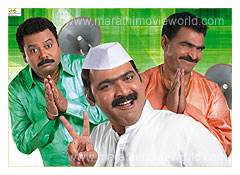
All the 3 leads in movie performs very well. Sayaji, retuning after a long time to Marathi screen gives full justice to character. Same with the Nagesh and Makarand. Nagesh, who is also director of the movie, looks amazing as Bajirao Dole, Sarpanch. But to mention one thing, Nagesh – perform really remarkable in his first venture as a director. Throughout the movie we feel that Nagesh as a director is competing strongly with Nagesh as an actor.
And finally, what to say about Makrand. He literally rules the movie from beginning. He makes movie really enjoyable through his unique style of dialogue delivery and performance. This movie will be another landmark in his career as an actor.
Overall the movie is enjoyable, perfect for current political situation and fully enjoyable. Go for it….!
